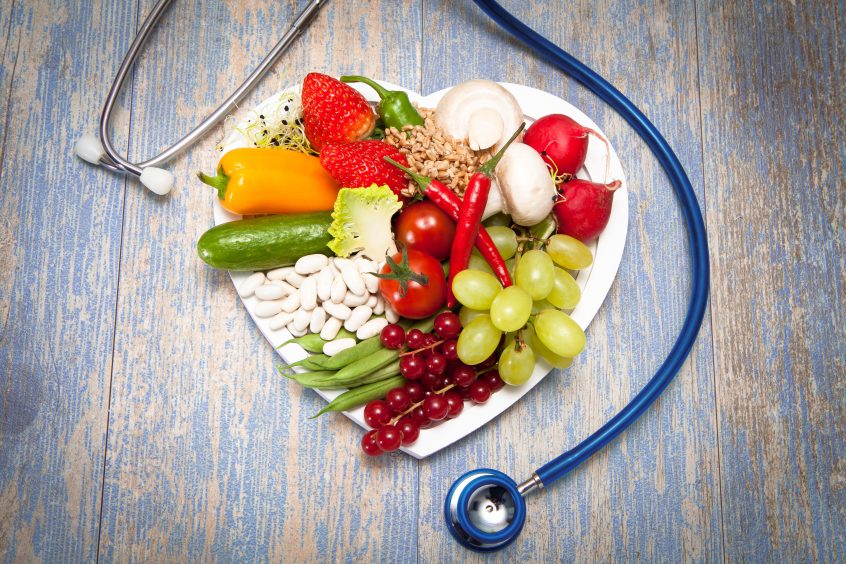It’s no secret that when we eat healthy food, we feel healthy. But why is this? How does the food we put in our body have such a grand effect on how we function from day to day?
When it comes to our health, the food we put in our body can have a significant effect, especially when it comes to our heart. Weight gain, physical inactivity, stress, high blood pressure, high cholesterol, and obesity can greatly increase the risks of heart disease and various cancers.
According to America’s Health Rankings,
- The United States ranks ninth in the world for life expectancy
- In the past year, obesity has increased by 5% affecting 31.3% of adults
- In the past three years, cardiovascular-related deaths have increased by 2%
- Oklahoma came in 44 for overall health.
- In the past six years, obesity increased by 17% and affects 36.5% of adults
- In the past three years, cardiovascular deaths increased by 5%
- Texas ranked 28th in overall health.
- In the past three years, cardiovascular deaths increased by 4%
- This is also due to a high prevalence of physical inactivity and diabetes
The food we eat gives our bodies the information and fuel it needs to properly function. If it does not get the right information, our metabolic processes can suffer and our health can decline. It is essential to have good nutrition based on healthy eating habits to enable you to stay healthy, active, and live a longer life.
In short, the nutrition you put in your body can help you avoid certain diseases that can put your life at risk and cause your health to deteriorate.
How does food affect our bodies?
The nutrients from the food we put in our bodies give our cells the ability to perform their necessary functions. Think of it as planting a garden. If you are planting a tomato seed, ideally you use the right soil and the right amount of sun for the best success. However, if you use the cheapest dirt and don’t give it enough sunlight you may still get a tomato, but the tomato may not be the ripest, roundest, reddest, or tastiest tomato.
In other words, giving our bodies the right nutrients can help you grow to a healthier version of yourself. Thinking about food from this aspect goes beyond calories and good food versus bad food. You need to focus on the foods you are putting in your body versus the foods you are excluding.
Look at food as a way to fuel your body and help fight cardiovascular diseases.
Nutrition and disease
When we eat food it goes through a digestive process. Part of this process involves absorbing vitamins and minerals from that food and distributing it into the bloodstream which leads to the blood vessels, coronary arteries, and the heart muscle.
Depending on what types of food you are eating can cause your heart to pump harder and exert more energy. This could eventually lead to heart failure and a heart attack.
Your sodium intake plays a major role in affecting your heart rate and blood pressure. By consuming salty foods, your body will retain water to dilute the blood volume. This causes more blood to circulate throughout your body and your heart to work harder.
The recommended sodium intake by the Centers for Disease Control and Prevention is 180 – 500 mg of sodium a day. However, Americans on average consume over 3,400 mg of sodium a day. Most of these are pre-prepared and processed foods.
A diet that is high in saturated and trans fats will elevate your bad cholesterol (LDL) and could lead to the hardening of arteries and plaque forming on the inner linings of blood vessels which will further narrow them. The narrowed openings mean that as the heart receives the blood it must work harder to maintain blood flow in order to pump blood through the narrowed channels.
Similarly, if you are not maintaining a healthy diet this could increase your risk for various cancers. According to a study published in 2018 by The BMJ, a study was performed on the amount of processing and the amount of change the ingredients go through to help improve flavor, coloring, and shelf life. It was found that for every 10% increase in consumption of ultra-processed foods was associated with a 12% higher risk for cancer in general and an 11% increased risk for breast cancer.
While these foods can cause harm there are foods that can help improve your health and heart function. Healthy fats such as olive oil and whole grains can help lower your cholesterol and help prevent plaque from forming in the arteries. By improving the blood flow, your heart will be able to pump blood easier causing less strain and stress on your heart which could eventually lower your heart rate.
What is poor nutrition
By depriving our bodies of the nourishment it needs can lead to poor nutrition and eating habits which can cause obesity, diabetes, and increase certain risk factors for stroke, heart disease, and cancer.
Poor nutrition is caused by putting the wrong types of food in your body that do not have the nutrients that we need most. These foods include ones that are low in fiber and vitamins or are high in fat, sugar, and salt. While many of the packaged foods we purchase at the grocery store meet our taste bud requirements, the way these are packaged and stored may strip the food of the nutrients our body requires and eliminate your chance of healthy weight loss.
Poor nutrition can also be caused by overeating. If you are taking in more calories than you are burning each day, even if these are the “right” foods, can eventually cause weight gain and lead to obesity. If you suffer from being overweight or obese, this can lead to diabetes and heart problems.
On the other hand, if you are undereating you could be depriving your body of the nutrients it needs. Those who suffer from diseases such as anorexia or bulimia are just as much in jeopardy of heart complications and disease as those who overeat.
If you are concerned about the number of calories you are putting in your body it is best to discuss with your doctor or nutrition and dietetics expert.
How does poor nutrition affect you?
Poor nutrition can affect your health in many ways, not only can it lead to certain diseases but it can also affect your mental health, energy levels, complexion, and your overall well being. In the short term, poor nutrition can contribute to stress, tiredness, and our capacity to work. Furthermore, it can lead to:
- being overweight or obese
- tooth decay
- high blood pressure
- high cholesterol
- heart disease and stroke
- type-2 diabetes
- osteoporosis
- some cancers
- depression
- eating disorders
Poor nutrition can impair your daily health and wellbeing and reduce your ability to lead an enjoyable and active life.
Healthy eating habits
We’ve all been told that healthy eating can transform your life and help you live a longer and more active one. But what does healthy eating actually mean and how do you start putting this into practice and breaking bad habits? For some, this may be a way to help them lose weight, for others the goal may be to lower their blood pressure, and for others, it may just be to have a healthier way of living.
This transformation doesn’t happen overnight. You can’t just wake up on Sunday morning and break all of your bad habits without the cravings. This is a gradual process and can be as simple as choosing steamed broccoli as a side instead of loaded mashed potatoes. Or choosing an apple over chips for your mid-morning snack.
Here are some helpful tips and ideas that will soon have you well on the way to bursting with health and vitality:
- Get more fruits and veggies in your day. Start your morning with a bowl of oatmeal and some blueberries. Aim for two servings of fruit and five servings of veggies each day.
- Eat less saturated and trans fats. Read the labels for the products you are purchasing. You may be surprised at the ingredients and opt for a different brand.
- Eat less salt. Make a conscious effort to put less and less salt on your food, until just a dash is all you need.
- Eat less sugar. Try substituting honey in your coffee and opt for less sugary desserts. For instance, if you are craving dessert, try blending frozen bananas and topping it some strawberries.
- Drink more water and aim for drinking half your body weight in ounces. Choosing water over sugary drinks can help you lose weight, clear your complexion, and, since our bodies are made up of 70% water, you may feel healthier all around.
- Check your portions. Fill half of your dinner plate with a variety of vegetables or salad, add lean protein foods such as meat, fish, chicken or legumes (chickpeas, lentils, kidney beans etc) to take up a quarter of the plate, last add in grain foods such as rice, pasta or noodles to take up the remaining quarter of the plate.
- Plan ahead. One of the main reasons people end up eating fast food or a bag of chips is because they are in a rush. Plan out your meals on the weekends, including your snacks, and purchase only what you need and prep your food. This will not only help you eat healthier, but it will also save you money.
If you are concerned about your nutritional habits it is best to discuss your options with your health care provider or a dietetic nutritionist.
If you are concerned with your heart health you should consider getting a Heart Scan at Advanced Body Scan in Oklahoma City or North Texas. The best prevention of cancer and heart disease is to catch them inside your body before they show up as outward symptoms. Advanced Body Scan has the technology to do just that.

